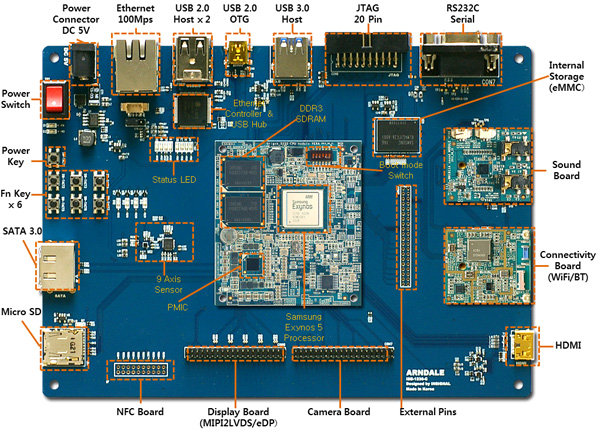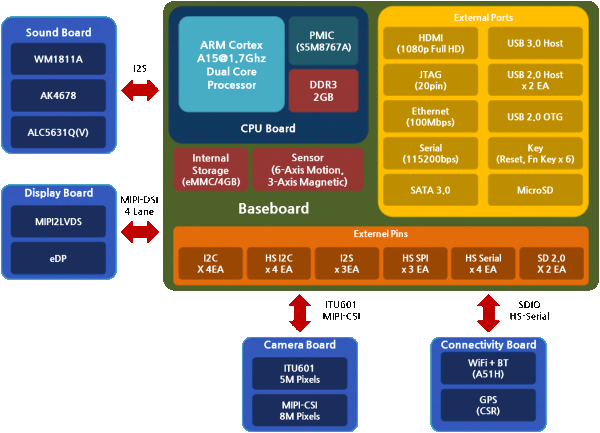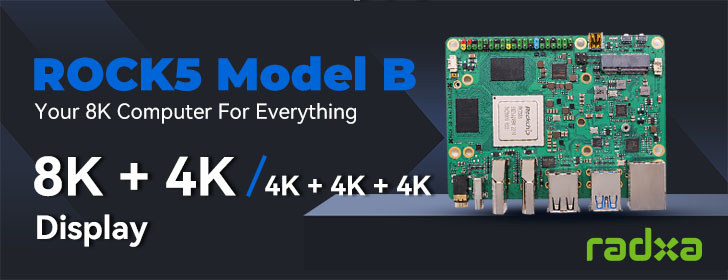Samsung has announced the first Cortex A15 development board available for purchase. Like the Origen board, Arndale development board has been designed by InSignal and features a dual core Exynos 5 (5250) cortex A15 processor @ 1.7 GHz, 2 GB RAM, internal storage via eMMC and plenty of ports. The development kit is composed of a CPU module (Exynos 5 , RAM and PMC) and a baseboard.

Here are Arndale development board specifications:
- CPU Board
- Exynos 5 [email protected] GHz dual core
- 2GB 32-bit 800 MHz LPDDR3/LPDDR2
- Base Board
- Sensors
- Accelerator : Invensence MPU-6050
- Gyro : Invensence MPU-6050
- e-Compass : AKM -AK8963C
- Camera Interfaces: ITU 601, MIPI CSI
- Video Ouput:
- HDMI 1.4 interface (micro HDMI)
- 1 channel eDP output Single WQXGA
- MIPI DSI interface
- USB:
- 1x USB3.0 Host
- 2x USB2.0 Host
- 1x USB 2.0 OTG
- SATA 1.0/2.0/3.0 interface
- 1 channel eMMC 4.5
- 1 channel SDIO 3.0
- 2 channel SD 2.0 (microSD slot)
- 4 channel high-speed UART(up to 3Mbps data rate for Bluetooth 2.0 EDR and IrDA 1.0SIR)
- 3 channel high-speed SPI
- 3 channel 24-bit I2S audio interface
- 4 channel I2C interface support , up to 400kbps
- 4 channel HS-I2C up to 3.1Mps
- 10/100 Mb Ethernet
- Sensors
4 “optional” board are also available:
- Sound board with Wolfson WM1811A Multi-Channel Audio Hub CODEC
- Connectivity board (WiFi/Bt/GPS) with Samsung SWB-A51H (ATHEROS AR6003) for Wifi and Bluetooth connectivity and CSR G05t for GPS support
- Camera board – 5M Pixel Camera capable of 15fps full resolution and 120 fps QVGA video capture.
- Display board -7″ Capacitive touch LCD
See the block diagram below for an overview of the complete development kit including CPU modules, main board and optional boards.

Samsung provides pre-built images of U-boot 2010. 12, kernel 3.0.31 and Android 4.11.r4, which can be downloaded from their resources section, and plan to release the source code in December. Hardware schematics are also available for download (except for the CPU module), and there’s already some documentation also it looks like work in progress. [Update: While checking out if Linaro was involved with this board, I found out they are, and provides Ubuntu server for the Arndale board]
The basic package (ARNDALE-5250-A) comes with the CPU module, the base board and the sound and connectivity boards (which are not really optional after all) and it sells today for $249. Shipments are expected to start on the 20th of November. If you go to ARM Techcon 2012 next week, you may also get one for free.
Visit howchip online store for details on pricing of different modules and accessories, and arndaleboard.org for further information about the board.
Update: Charbax video about Armdale board at ARM Techcon 2012.

Jean-Luc started CNX Software in 2010 as a part-time endeavor, before quitting his job as a software engineering manager, and starting to write daily news, and reviews full time later in 2011.
Support CNX Software! Donate via cryptocurrencies, become a Patron on Patreon, or purchase goods on Amazon or Aliexpress




Isn’t this basically the same hardware as the $249 Chromebook? I.e. the netbook without the actual netbook, but for the full price? Somehow in the “dev board” market it seems vendors still think it’s completely normal to rip off developers with ridiculously overpriced products. The truth is the only people who will buy this, is those who spend not their own money, i.e. buying on some company’s funds to develop a product for their day job. Not an average hobbyist. Well I suppose they are perfectly okay with that, but is it better for the platform in the long run?…
What a bloated board full of things many people would not be interested in. Pare it down to something like the Odroid-X board (along with a suitable price reduction) and it would fly off the warehouse shelves!
Get it down to: power, Ethernet, SATA, HDMI, USB, and SD/microSD for storage. Only put on SATA and Ethernet if they’re “native”. If they’re through USB devices, leave them off and let us connect our own. That should make a device suitable for a network server, HTPC client, or just a desktop.
@rm It has much more available ports/options than the Chromebook, but you’re right development boards may not be as cost sensitive as consumer product. They are also (usually) low volume, so it may be difficult to get the price down. At this price, I assume it’s still affordable for independent developers who specifically want to develop for the Cortex A15/ Mali T-604 GPU. @Ian Tester This board is mainly destined to (mobile) developers, so they added most features that can be found on smartphones/tablets. Having said that, I think it would have been nice if the sound and connectivity boards… Read more »
For those interested in the server side, Linaro has instructions to run Ubuntu server on that board: https://wiki.linaro.org/Boards/Arndale/Setup/EnterpriseUbuntuServer
I’ve updated the post, with a Charbax’s video of the Arndale development board (including unboxing) at ARM Techcon 2012.
100mbps Ethernet on a $250 board? They must be out of their frickin minds. I wonder who is the genius who took the decision to leave Gigabit Ethernet out.